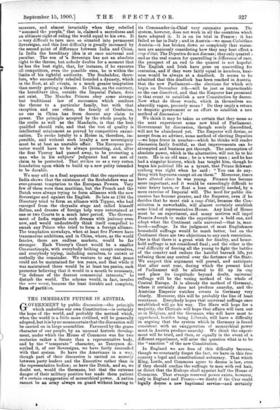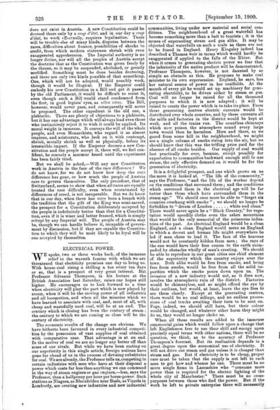THE IMMEDIATE FUTURE IN AUSTRIA. G OVERNMENT by public discussion—the principle
which underlies our own Constitution—is certainly the hope of the world, and probably the method which, when the world is a little more civilised, will be generally adopted, but it is by no means certain that the discussion will be carried on in large assemblies. Favoured by the grave character of our people, by an unusual historic develop- ment, under which the House of Commons was for two centuries rather a Senate than a representative body, and by the " temperate " character, as Tennyson de- scribed it, of our Sovereigns, we have fairly succeeded with that system. So have the Americans in a way, though part of their discussion is carried on secretly between party leaders and the Executive rather than in the representative bodies ; so have the Dutch, and so, we doubt not, would the Germans, but that the extreme danger of their military position has made them patient of a certain exaggeration of monarchical power. A nation cannot be an army always on guard without leaving to its Commander-in-Chief very extensive powers. The system, however, does not work in all the countries which have adopted it. It is on its trial in France ; it has failed so far in Italy ; and in Austria—we mean Cisleithan Austria—it has broken down so completely that states- men are anxiously considering how they may best effect a coup d'etat. The Deputies do not discuss; they only quarrel : and as the real reason for quarrelling is difference of race, the prospect of an end to the quarrel is not hopeful. The English and Irish have gone on quarrelling fox centuries, and if they were fairly equal in numbers, busi- ness would be always at a deadlock. It seems to be admitted that this deadlock has been reached in Austria that the new Parliament—the elections for which wilt begin on December 4th—will be just as impracticable as the one dissolved, and that the Emperor has promised in that event to establish a new Constitution by decree. Now what do those words, which in themselves ar6 absurdly vague, precisely mean ? Do they imply a return to despotic government or an effort to establish a new method of discussion ?
We think it may be taken as certain that they mean as the next experiment some new kind of Parliament. Government by discussion, though sorely discredited, will not be abandoned yet. The Emperor will devise, or accept from an adviser, some method of electing Deputies —we hope fewer in number—which he thinks will render discussion fairly fruitful, so that improvements can be attempted and business got through. The assumption of absolute power, which is the alternative, will not be to his taste. He is an old man ; he is a weary man ; and he has had a singular history, which has taught him, though he began his political life as a tyrant, that Prince Schwart- zenberg was right when he said : " You can do any- thing with bayonets except sit on them." Moreover, times have altered since he was young. Finance has become more important, and it would be exceedingly difficult to raise heavy taxes, or float a loan urgently needed, by a mere exercise of Imperial will. The need for public dis- cussion has become greater, and the Emperor, even if he decides that he must risk a coup &Hat, because the Con- stitution is unworkable, will almost certainly establish some kind of representative House. Any kind of House must be an experiment, and many motives will impel Francis Joseph to make the experiment a bold one, and adopt what the Continent calla universal—that is, man- hood—suffrage. In the judgment of most Englishmen household suffrage would be much better, but on the Continent there are two objections to any such restriction. One is that there is a great wish for finality, and house- hold suffrage is not considered final ; and the other is the real difficulty of forcing all the young to fight the battles of the country and endure the hateful barrack life, yet refusing them any control over the fortunes of the State. We suspect this argument will prevail, and anticipate that after next year, during which the present kind of Parliament will be allowed to fill up its cup and place its ineptitude beyond doubt, universal suffrage will be the voting method of the whole of Central Europe. It is already the method of Germany, where it certainly does not produce anarchy, and the Austrian Emperor watches events in Germany very closely. Moreover, this will be probably the line of least resistance. Everybody hopes that universal suffrage once established will go his way. The Slays will hope for a majority, the Clericals will hope that affairs will turn out as in Belgium, and the Germans, who will have most to apprehend, besides being Liberals, will have a difficulty in arguing that the system which in Germany is found consistent with an exaggeration of monarchical power must in Austria produce anarchy. We think the experi- ment will be tried, and then, or equally in the event of a different experiment, will arise the question what is to be the " sanction " of the new Constitution.
In England we are free of this difficulty because, though we constantly forget the fact, we have in this free country a legal and constitutional autocracy. That which King, Lords, and Commons agree to decree is law, even if they should confine the suffrage to men with red hair, or direct that the Bishops shall appoint half the House of Commons. That strange reserved power exists. however, only in England and France—we doubt if the Czar could legally decree a new baptismal service—and certainly does not exist in Austria. A new Constitution could be decreed there only by a coup d'etat, and in our day a coup d'dat, to work effectually, requires legalisation. There will be trouble else of many kinds, disputes between the races, difficulties about finance, possibilities of shocks to credit, from which modern statesmen shrink with even exaggerated apprehension. The Imperial authority is no longer divine, nor will all the peoples of Austria accept the doctrine that as the Constitution was given freely by the throne, so it may be suspended, abolished, or greatly modified. Something must be done besides decreeing, and there are only two kinds possible of that something. One, which will not be adopted, would possibly work, though it would be illogical. If the Emperor could embody his new Constitution in a Bill and get it passed by the old Parliament, it would be difficult to resist it, even though such a Bill would stand condemned from the first, in good legists' eyes, as ultra vires. The Bill, however, would never pass, and consequently will never be proposed. The other expedient is the old one, a plebiscite. There are plenty of objections to a plebiscite, but it has one advantage which will always lead even those who instinctively reject it to wish it could be applied. Its moral weight is immense. It conveys the will of the whole people, and even Monarchists, who regard it as almost impious, and aristocrats, who look on it with contempt, shrink, morally shrink as well as physically, before its irresistible impact. If the Emperor decrees a new Con- stitution and the people accept it, there will, we feel con- fident, be scarcely a murmur heard until the experiment has been fairly tried.
But we shall be asked,—Will any new Constitution work in Austria in the face of the race difference ? We do not know, for we do not know how deep the race difference has gone, or bow much the people of Austria care to govern themselves. The only precedent, that of Switzerland, seems to show that when all races are equally treated the race difficulty, even when accentuated by differences of creed, is not insuperable. But we do know that in our day, when there has once been a breach with the tradition that the gift of the King was semi-sacred, the prospect for a Constitution deliberately accepted by the people is indefinitely better than that for a Constitu- tion, even if it is wiser and better framed, which is simply octroye by any Imperial will. The people of Austria may be, though we can hardly believe it, incapable of govern- ment by discussion, but if they are capable the Constitu- tion to which they will be most likely to be loyal will be one accepted by themselves.







































 Previous page
Previous page